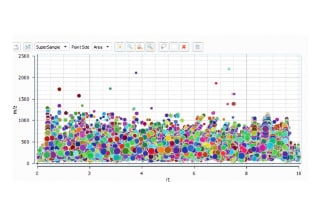MARS
Improve accuracy in metabolomics and exposomics research
In metabolomics research, navigating the intricate landscape of LC-MS data is essential. Thousands of features must be compared across numerous individual samples, demanding efficient data processing and visualization.
Mass Analytica MARS (MetAbolomics ReSearch) Software is a new software application specifically developed for untargeted and semi-targeted LC-MS-based metabolomics and exposomics data analysis. MARS covers all steps from peak detection to metabolite annotation and pathway analysis. With workflows incorporating, identification of multiple adducts, automated in-source fragmentation detection, and in-silico MS/MS spectrum validation your lab can improve annotation accuracy and efficiency.
Overview
- Meet untargeted and semi-targeted LC-MS-based metabolomics and exposomics research requirements with a specially developed solution
- Cover all steps in LC-MS-based untargeted and semi-targeted analysis
- Improve annotation accuracy across peak detection, metabolite annotation, and biopathway analysis
- Get customizable identification of multiple adducts, automated in-source fragmentation detection, and in-silico MS/MS spectrum validation
Recommended Use: For efficient data processing and visualization in metabolomics and exposomics research.
Streamline data processing with complete compatibility
- Fully compatible with Waters data, including MSE, SONAR, HDMSE, and calculation of CCS values
- Full integration with waters_connect Software Solutions through a streamlined end-to-end workflow
- Utilize software processing capabilities across multiple MS instruments with a vendor-neutral solution
Achieve higher confidence in your identifications
- Merge positive and negative ion data from the same samples for a higher degree of confidence in your identifications
- Get a clearer picture with 3D peak visualization of HDMSE data using IMS viewer
- Simple peak and spectra interrogation and peak editing
Advanced Statistical Analysis Toolbox
- Meet all your analysis requirements with a toolbox of supervised and un-supervised multivariate statistical models, such as principal component analysis (PCA), partial least squares regression (PLS), partial least squares-discriminant analysis (PLS-DA), and orthogonal projections to latent structures discriminant analysis (OPLS-DA)
- Identify trends in your data with Trend Analysis
- Generate calibration curves for compound quantification
Efficient annotation with database-driven analysis
- Annotate features from publicly available and custom .sdf & .csv databases (e.g. HMDB)
- Visually highlight confidence in annotation with traffic light system
- Perform in-silico fragmentation and improve fragment matching with MSMS validator
- Increase confidence scores with the ability to process ion mobility data and use CCS measurements
- Assess the presence of various biotransformations with the built-in Drug MetID functionality
